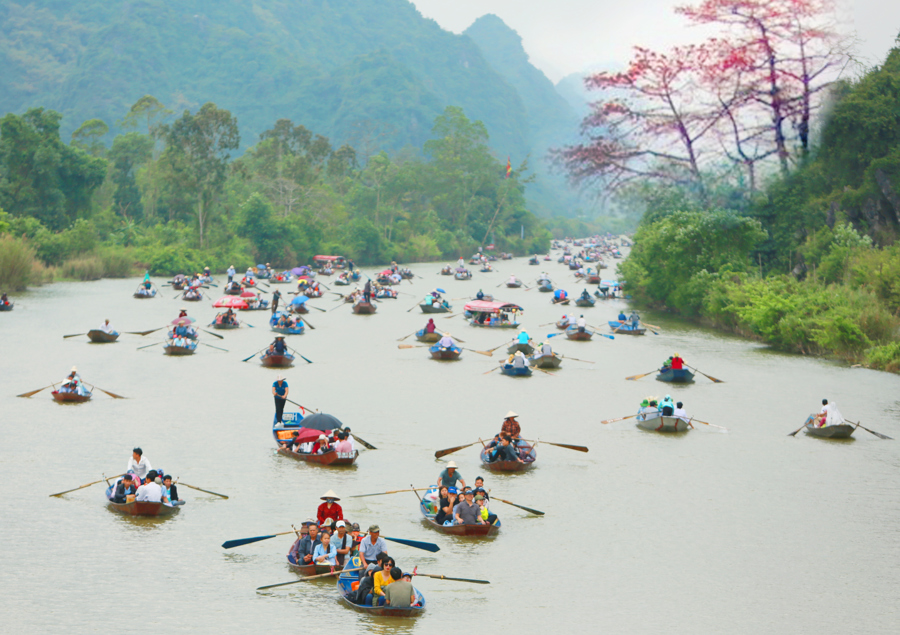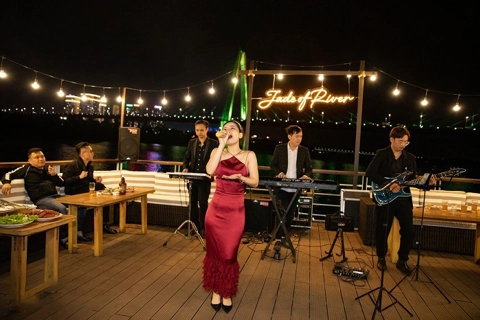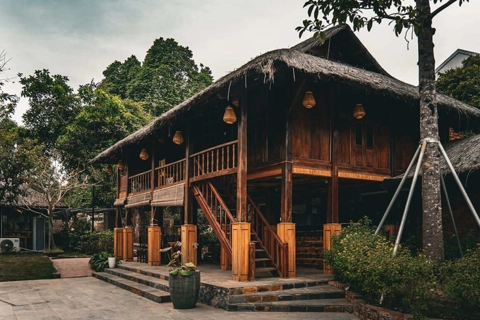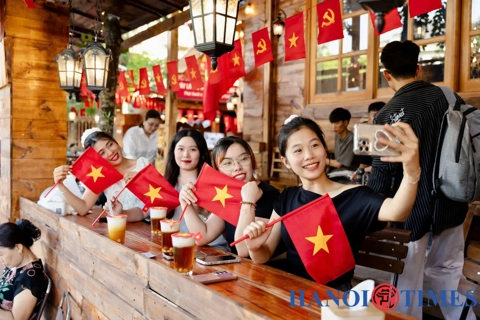Huong Pagoda complex recognized Hanoi's tourist destination
Built in the 15th century and renovated multiple times, the Huong Son complex has preserved its historical and scenic value.
Vice Chairman of the Hanoi People's Committee Nguyen Manh Quyen this week signed a decision to recognize the Huong Son special relic complex (Huong Pagoda) in My Duc District as a city-level tourist destination.
About 60 kilometers southwest of downtown Hanoi, the Huong Pagoda scenic spot gives visitors the feeling of being lost in a fairyland.
Covering more than 4,900 hectares, the Huong Pagoda complex is a mosaic of pagodas, temples, and caves full of stunning stalactites and stalagmites dedicated to the worship of Buddha and deities associated with indigenous agricultural beliefs.
Built at the end of the 17th century and renovated multiple times, the Huong Son complex has preserved its historical and scenic value, contributing to the distinctive and diverse Buddhist culture in the country.
The Huong Pagoda Festival is traditionally held from the sixth day of the first lunar month through the third lunar month. It is the biggest and longest traditional festival in Hanoi and in Vietnam as a whole.
A pilgrimage to the Huong Pagoda complex during the Lunar New Year is a spiritual journey to the land of Buddhism. Visitors tour the pagodas, temples, and caves and take part in ceremonies to seek the blessings of Buddha.
Half of a million pilgrims to the Huong Pagoda Festival in three days of the Lunar New Year (Tet festival) 2024. Photo: Pham Hung/The Hanoi Times |
According to the management board of the Huong Son special relic complex, about one million pilgrims attend the Huong Pagoda Festival annually. Visitors come to worship Buddha and admire the majestic landscape of mountains, caves, and pagodas, where the Bodhisattva's enlightenment is passed down.
According to the management board of the Huong Son special relic complex, about one million pilgrims attend the Huong Pagoda Festival annually. Visitors come to worship Buddha and admire the majestic landscape of mountains, caves, and pagodas, where the Bodhisattva's enlightenment is passed down.
"Hanoi's Huong Pagoda is a cultural and religious complex that includes many pagodas, temples, and communal houses. The pagoda is also one of 11 special national relics in Vietnam. These are great values for the development of cultural and spiritual tourism in the Huong Pagoda complex," said a source from the Hanoi Department of Tourism.
In recent years, in order to attract tourists, the management of Huong Pagoda relics has been innovated, focusing on preserving the value of the relics and landscape and harnessing it for festive activities and services. In 2023, Huong Pagoda welcomed more than one million visitors.
"In the coming period, the Hanoi Department of Tourism and the My Duc District People's Committee will define tasks to make the complex a high-quality tourist attraction that meets the requirements to be recognized as a national tourist area," the source added.
"By 2030, the Huong Pagoda complex will become a national tourism area, one of the tourism centers of the capital and the whole country, and will apply to be listed as a UNESCO World Heritage Site," according to the Department.
Besides the Huong Son complex, the Hanoi People's Committee also recognized Hong Van tourist site in the outlying district of Thuong Tin as a city-level tourist destination.
Hong Van is a suburban commune along the Red River. For many years, the locality has been making an effort to develop rural tourism which has become one of the commune’s strengths. Thanks to that, it became a tourist attraction to gain significant economic benefits.
Featuring the typical characteristics of a rural village in northern Vietnam, Hong Van tourist site focuses on developing culture tourism, agriculture tourism, and MICE tourism.
According to Tran Quoc Bao, Chairman of the Hong Van People's Committee, the commune's rural tourism has attracted an average of 35,000 visitors annually, with an estimated tourism revenue of over VND10 billion (US$406,000)."
"We have set the target to make Hong Van an attractive destination to domestic and foreign tourists in 2025; establish the commercial, service, and tourism as the commune's key economic sector," Bao said.
Vietnam's Law on Tourism 2017 states that to be recognized as a city-level tourist area, a site must meet the following conditions: Tourism resources with advantages in natural landscape or cultural value; Infrastructure, facilities, and services meet the accommodation, dining, and other needs of tourists; Connected to the national transportation and telecommunications infrastructure system; and Ensuring security, order, social safety, and environmental protection.











